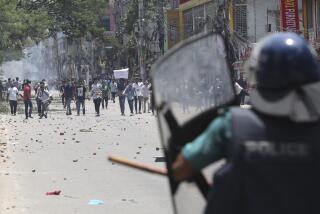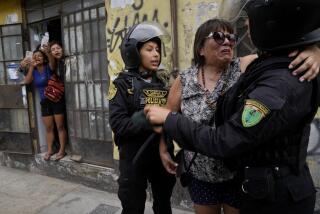Roads Blocked, Communications Cut in Tibet
- Share via
LHASA, Tibet — Police sealed off parts of Lhasa on Wednesday and interrupted communication links to the Tibetan capital in an effort to prevent renewed violence on the 37th anniversary of the Chinese occupation of the Himalayan region.
Convoys of police vehicles with their sirens blaring paraded through the city in a show of force before dawn, and authorities sealed off roads to two Buddhist monasteries whose monks led a violent anti-Chinese protest Oct. 1 that reportedly resulted in at least 14 deaths and dozens of injuries.
Downtown streets were deserted during the morning and communications between the Tibetan capital and the outside world were cut by midday.
A U.S. consular official in Chengdu, the closest major Chinese city to Tibet, said an operator at the Lhasa Hotel told his staff that “foreigners cannot receive calls today.” There was no indication when telephone and telex service with Tibet would be resumed and China warned foreigners not to visit Lhasa.
Meanwhile, Beijing accused the U.S. Senate of meddling in China’s domestic affairs by adopting a unanimous resolution Tuesday urging President Reagan to meet with the Dalai Lama, the exiled Tibetan spiritual leader, and requiring the President to certify that China is making progress on human rights in Tibet before any new sale of military supplies or technology to China.
Foreign Ministry spokeswoman Li Jinhua called the resolution a “serious incident” and said Beijing had issued a “strong protest” against the congressional action.
In India, the Dalai Lama denied that he incited Tibetan unrest. Speaking at his home in Dharmsala, in the Himalayan foothills, he said Tibetans are demanding independence because they are unhappy under Chinese control.
He endorsed nonviolent protests for Tibetan independence, saying, “Yes, in a peaceful manner, that is important.” He also said he wants to maintain his contacts with the Chinese government.
The Dalai Lama fled Tibet in 1959 after an abortive uprising against the Chinese.
The Chinese government sent troops into Tibet on Oct. 7, 1950, to crush a poorly armed resistance movement. The move gave China control of the isolated state previously ruled by a god-king, the Dalai Lama, and Buddhist clergy.
Two weeks of anti-Chinese unrest began Sept. 27 with a protest march by Buddhist monks demanding independence.
Police swung batons Tuesday to break up a march by more than 60 young Buddhist monks demanding the release of colleagues detained during the Sept. 27 protest.
More to Read
Sign up for Essential California
The most important California stories and recommendations in your inbox every morning.
You may occasionally receive promotional content from the Los Angeles Times.










